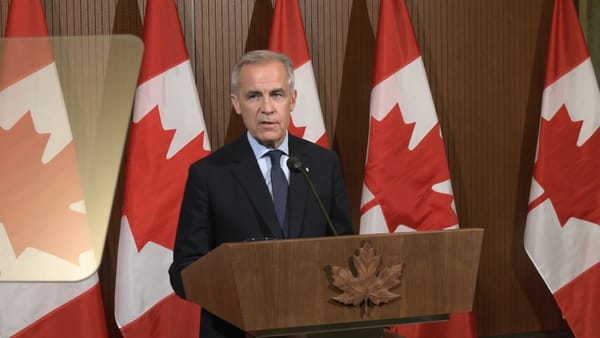Bill C-63: A Trojan Horse for Authoritarianism in Canada

Introduction
There comes a moment in a nation's history when its citizens must choose: speak up or be ruled in silence. Canada is fast approaching that moment—and most people are sleepwalking right through it.
Bill C-63, the so-called Online Harms Act, is not merely an ill-conceived attempt to regulate online behavior. It is a seismic shift in how speech, thought, and even future intentions are governed in this country. Disguised as a shield for the vulnerable, it is in truth a sword aimed at the heart of civil liberties.
This bill will not just annoy or inconvenience us—it will fundamentally and permanently alter the Canada we thought we lived in.
A Bill That Doesn’t Just Punish Actions—It Punishes Thought
Let’s break down what this bill actually proposes:
1. Vague, Circular Definitions of "Hatred"
Bill C-63 seeks to enshrine in law that “hatred” is “an emotion that involves detestation or vilification and that is stronger than disdain or dislike.” In other words, hatred is defined as… hatred. That’s the legal bedrock this bill rests on.
This vagueness is not an oversight—it’s a feature. Ambiguous laws are the playground of authoritarianism. They give the state unlimited flexibility to go after whoever they want, whenever they want.
2. Turning Any Offense Into a Hate Crime
Under this bill, any offense under any federal law—no matter how minor—can be classified as a “hate crime” if the state argues it was motivated by hatred. Graffiti. Vandalism. Even a politically charged protest.
And if that happens? Life imprisonment is on the table.
Yes, life in prison for actions like vandalism, if the state decides your motive was unacceptable.
(Source: Parliament Legislative Summary)
3. Preemptive Censorship: Punishment for Speech You Haven’t Even Said Yet
The bill allows for peace bonds—court orders restricting individuals—based purely on the fear they might commit a hate crime in the future.
That means a judge can impose house arrest, ban you from speaking to people, or force you to wear an electronic monitoring bracelet because someone fears what you might say.
This is not science fiction. It is right there in black and white in the bill.
(Source: Wall Street Journal)
4. Resurrecting Section 13—A Free Speech Zombie
Bill C-63 revives Section 13 of the Canadian Human Rights Act, previously repealed after widespread condemnation. It allows citizens to file complaints about "hate speech" and receive cash payouts—up to $20,000—from the accused, even without any criminal conviction.
This creates not justice, but a bounty system for speech policing.

Steven Guilbeault: Radical Roots, Radical Powers
The man tasked with overseeing this descent into legislative madness? None other than Steven Guilbeault, a lifelong activist and ideological crusader who is now Minister of Canadian Heritage.
- In 2001, he scaled the CN Tower to hang a protest banner accusing North America of being “climate killers.”
- He once snuck onto Alberta Premier Ralph Klein’s roof to install solar panels without permission—as a protest stunt.
(Source: Wikipedia)
These are not the actions of a principled dissenter—they are the actions of a man for whom cause justifies method, no matter how extreme. Yet somehow, in this drowsy and docile nation, this man was handed power over our cultural and ideological institutions.
Only in Canada—where most people are too polite, too distracted, or too complacent to notice—can someone with a history of extremist stunts and disregard for law be promoted to enforce national ideology.
Steven Guilbeault isn’t just enforcing policy. He’s shaping what is culturally permissible. The power to silence dissenting viewpoints has been placed in the hands of a man who has spent his entire career trying to silence opposing views. Let that sink in.
Canadians Are Asleep at the Wheel
We are in the middle of a slow-motion national implosion. Yet most Canadians remain either unaware or indifferent. There are no mass protests. No robust national debate. Just a numbing silence, broken only by vague platitudes about “safety” and “kindness.”
This isn’t surprising. After all, this is the same country that just voted in Mark Carney, a man whose globalist resume reads like a parody of unaccountable elite power.
When voters elevate central bankers and radical ideologues to lead them, it is not a failure of democracy—it is a failure of attention.
We are not being taken over. We are surrendering.
No Government, No Debate, No Consent
What makes this even more disturbing is that all of this is happening without a sitting government.
Parliament has been prorogued. The House of Commons has been suspended for months. There is no active debate. No question period. No real scrutiny. While Canadians struggle with inflation, housing, and growing uncertainty, the government has effectively shuttered its own democratic process—and yet continues to push forward with radical legislation like Bill C-63.
A government without Parliament is not a democracy. It is an executive regime acting without oversight.
This bill is not being born out of a healthy democratic exchange. It is being slid through the machinery while no one is looking—not the media, not the public, not even the opposition.
And that is perhaps the most terrifying part of all.
The Real Consequences: This Is Not Hyperbole
If Bill C-63 passes—and with the Liberal-NDP alliance, that’s likely—Canada will be a fundamentally different country:
- Your speech will be judged by political tribunals, not peers.
- You may be punished for intentions, not actions.
- Dissenters will be silenced—not with logic or debate, but with ankle bracelets and prison sentences.
- Self-censorship will become the default.
And here’s the most chilling part: under this new regime, even this very article—written in defense of democratic freedoms—could be interpreted as a form of “hate.”
A government official or complainant could argue that it "vilifies" those supporting the bill, or that it "discredits" the legislation in a way that fosters “detestation.” That’s the problem with laws built on emotional thresholds—truth becomes a liability.
This isn’t paranoia. It’s precedent.
Do not be fooled by the framing. This is not about online bullying. It is about control. Ideological conformity. State-managed thought.
And once these tools exist, they will not remain in the hands of “reasonable” people forever. The machinery of repression, once built, is always used.
When Even Jordan Peterson Walks Away
This isn’t just theoretical. It’s already happening.
Dr. Jordan Peterson, one of Canada’s most internationally recognized intellectuals, has left the country—relocating to the United States in direct response to Bill C-63 and the broader authoritarian drift he sees in the current Liberal government.
In his own words, Canada is “well on its way to becoming a totalitarian hellhole,” and he has made it clear he will not raise a family in a country where truth is criminalized and speech is policed.
“Canada is unrecognizable. I won’t raise a family in a country where truth is criminalized.”
— Jordan Peterson, December 2024
Peterson’s departure is not symbolic. It is a line crossed.
When a man who spent years defending Canadian values on the global stage no longer sees a future here, the rest of us should stop and ask why.
This is not a partisan issue. This is not hyperbole.
This is a canary-in-the-coal-mine moment—and we ignore it at our peril.
What Can We Do?
We still have time. Just barely. But only if we wake up now:
- Read the bill yourself. Don’t take my word for it. (Link to full text)
- Call your MP. Let them know you are watching.
- Support legal challenges like those from the Canadian Constitution Foundation.
- Talk about this. Online. In person. In your communities.
Silence will be interpreted as consent.
Conclusion
Canada has reached a precipice. And Bill C-63 is not a step—it’s a plunge into a country we won’t recognize in five years.
There is still time to stop this. But not much.
And once these laws are passed, they will not be easily undone.
Wake up, Canada.
This is not politics as usual.
This is the beginning of something very dark.
References
- Justice Canada – Bill C-63 Overview
- Parliament of Canada – Legislative Summary
- Wall Street Journal: "Crime and Punishment, Not in That Order"
- Wikipedia – Steven Guilbeault
- New York Post – Jordan Peterson Warns of "Totalitarian Hellhole"





